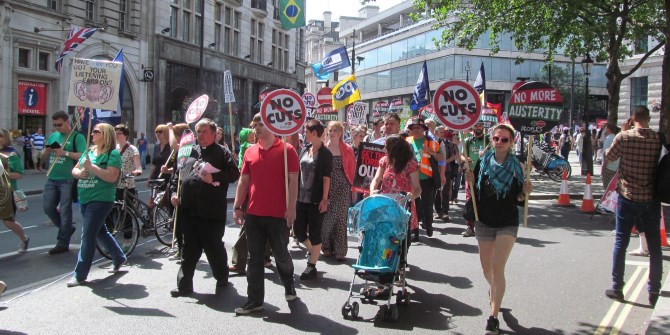 Lea Ypi explains why Change UK – The Independent Group appears to be aligning itself to a very different tradition of thinking about the relationship between citizens and representatives.
Lea Ypi explains why Change UK – The Independent Group appears to be aligning itself to a very different tradition of thinking about the relationship between citizens and representatives.
Modern democracy, wrote one of the great political scientists of the past century, is inconceivable – save in terms of party government. If that is true, when democracy is in crisis, a new political party might in principle offer opportunities for a way out. The newly created Change UK/Independent Group sees itself as a fresh political force breaking the way old politics works. It wants to occupy a space in the centre that traditional party divides are accused of having left void. It urges people to make change happen.
Except Change UK is not your standard political party. It has no manifesto, no popular base, no memory of struggles, victories and defeats. Instead of being a movement in search of political representation, it is a group of elected representatives in search of a movement. Instead of being the many represented by a few, it is the few urging the many to get involved.
Elections are arguably one of the most important moments in which a political group consolidates its principles and identity. It is how a new political force gathers the popular support that legitimises its demands for change. But Change UK is not that interested in elections either. If members were interested in popular mobilisation – campaigning to persuade fellow-citizens for the need to change, deliberating with supporters over principles – they would seize the first opportunity to confront their adversaries in by-election campaigns. Instead, they argue, fighting a by-election would “crush the birth of democracy”.
Change UK may not have a manifesto but it must at least have a vision of democracy. Except, on closer inspection, it turns out to be not very democratic. The birth of democracy, to return to their favourite formulation, is associated to rule by the many. In the Greek polis, the many ruled themselves by making direct decisions in the Athenian assembly. In modern societies, the many are too many and too diverse to speak directly for themselves. They speak through representatives in parliament. The extent to which the relation is democratic depends on the degree of proximity between representatives and represented. When that relationship is not subject to ongoing scrutiny it is not clear who the representatives speak for. Or what they speak about.
The more democratic a representative relation is, the more likely it is that the voice of the represented is heard in parliament (and not just on election day). Maintaining a close relation between professional politicians and the people who elect them is the only way to ensure that the voice of the many is continuously heard. For radical democrats, the purpose of democratic politics was to ensure that powerful people with more money, knowledge, and means to access public office were kept in check by the masses; that the few were constantly scrutinised by the many. To this effect they advocated a number of measures: mass membership in political organisations, imperative mandate, mandatory reselection, mechanisms of deselection of MPs, rotation in office, and so on. This is what democratic theorists call “the delegate” model of representation.
The Labour Party’s recent moves to expand membership along with proposals to change the relationship between members and MPs are part of this tradition. MPs are seen as only one of the links in the chain of democratic participation, they are by no means the most important one. Every MP and every decision made by them must remain accountable to party members at every step of the way.
Labour party leaders are often accused of authoritarianism. But if Labour really had been in the business of silencing criticism and undermining democracy, it should have discouraged rather than encouraged the delegate model of representation. The current Labour Party may have many flaws but a lack of democratic commitment is not one of them.
The same cannot be said about Change UK. The expressed refusal to fight by-elections and the arguments given to motivate that refusal signal its alignment to a very different tradition of thinking about the relationship between citizens and representatives. Members of Change UK insist that there is no reason to subject their views to democratic scrutiny since their values have not changed. But even if that were true, MPs are not selected only for the values they embrace but also for how they interpret those values in public life, and for the policy proposals they generate on that basis. A cursory look at CHUK’s statement of values in connection to particular public policies reveals sharp differences between those policies and the manifesto of the Labour party on the basis of which its former Labour members were elected. The only argument in their defence is given by a view of representation where MPs retain independence from their constituents: what is often called the trustees’ model of representation.
Historically, the emergence of the trustees’ model is associated to an explicitly anti-democratic attempt to isolate politicians from the power of the many. Its origins are in the explicitly moderate (we might say ‘centrist’ thought) of authors like Sieyes, Constant or Madison. The trustee model seeks to conceive of the representative relation as one in which political institutions are authorised by the masses but isolated from them. The argument is essentially an elitist, technocratic one: since modern life is about division of labour, only those with accumulated knowledge, expertise, and the right degree of wealth or skill are in the best position to make decisions about common affairs. The point of political authority is to guarantee the minimal amount of security that enables particular individuals to pursue their private affairs. The institutions that work best are, as in CHUK’s statement of values, those where “well-regulated private enterprise can reward aspiration and drive economic progress”. Disagreements of principle are reducible to disagreements of policy.
On the trustees’ model of political representation, once representatives are selected, their link with the represented is essentially a fiduciary one, like the link between a bank manager and the people who put money in a bank account. Once money is in the bank, you trust the bank managers to do their job. Once elections are over, you trust politicians to represent the people. While that model is much more pervasive in the electoral systems and political institutions of Western liberal democracies, the divide between professional politicians and ordinary people on which it is premised is arguably at the heart of what citizens resent the most in contemporary liberal politics.
To revive democracy, one has to depart from the trustee model of representation and consolidate the radical democratic one. Change is needed and change is coming. But it won’t come from a group of politicians whose democratic antipathies go so deep that they resent confrontation with ordinary citizens at every level, including in by-elections, the most basic level of representative accountability.
_________________
Note: a shorter version of the above was first published in the New Statesman.
 Lea Ypi (@lea_ypi) is Professor of Political Theory at the London School of Economics and Political Science and co-author of The Meaning of Partisanship.
Lea Ypi (@lea_ypi) is Professor of Political Theory at the London School of Economics and Political Science and co-author of The Meaning of Partisanship.
All articles posted on this blog give the views of the author(s), and not the position of LSE British Politics and Policy, nor of the London School of Economics and Political Science.








“…by-elections, the most basic level of democratic accountability.”
The perfect expression of why, in a Parliamentary Democracy, a popular vote or referendum is the least “democratic” level of accountability.
For what should happen when 51.9% of votes, equal to 37% of the Electorate, are in favour of, let’s say Proposition B over Proposition R? Must all MPs automatically vote for all B-related legislation, or only 37% of the 650, the others voting against or abstaining, to reflect the referendum result? How should it be decided which MPs play which ‘roles’? Should all MPs who believe Prop B will do more harm than good resign and fight by-elections on that single issue? Or should the Executive ignore Parliament and “just get on with it”?
These and other questions about PeoplesVotes remain not only unanswered but unasked, including by ChangeUK. Cameron’s attempt to adulterate representative democracy with ad hoc interference by vox populi merely to resolve an internal party political dispute was ill conceived and irresponsible. It should be the subject of a public enquiry before Parliament even contemplates repeating a constitutional folly of this magnitude.
A lot of the article criticises the refusal of the Change UK MPs to force by-elections. I remember hearing an interview on Radio 4 with one of the founders of the SDP where he admitted that the big mistake at the beginning made by its MPs was not resigning to force by-elections. So I was surprised to find the Change UK MPs repeating the mistake. If they could win a mandate now from their constituents, they’d have a much better chance of keeping their seats at the next election.
Alias. They know they won’t get a mandate, which is why they won’t subject themselves to a by election. They would, in fact, be humiliated, and then the ‘No Change’ party would be moribund.
Surley, Change UK should join The Lib Dems. Their aims appear the same.The Lib Dems have an extablishment netwoek, are recruiting new members which hopefully will reflect, sooner or later in the polls
Regards
Isn Worsley
I can’t think why this on the LSE website. It reads like a partisan statement on behalf of the Labour Party trying to rubbish a new political party which might take votes off Labour. In liberal democracies new groupings and parties emerge all the time and the idea that they are inherently undemocractic because they do not always follow the same route as established political parties is ridiculous. The voters will decide whether the arguments put forward by Change UK have any merit and therefore whether they have a future or not. I could not follow the relevance of the internal rules of the Labour Party. Political parties are free to decide how much say ordinary members should have and on what issues. However, to most voters it is irrelevant whether members have had a major or minor say in determining the manifesto offer.